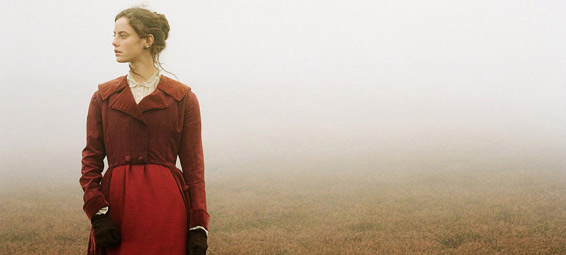Man is just another animal, and perhaps the world’s most inscrutable animal, in director Andrea Arnold’s (Fish Tank) adaptation of Emily Bronte’s 19th-century English novel of love and revenge. This is a version that revels in getting down in the muck to tell a raw version of the love story of Heathcliff (James Howson) and Catherine (Kaya Scodelario).
The shaky, handheld camera work used throughout the film makes for a naturalistic telling — underlined by an abundance of shots of dogs, and birds, and a dead rabbit — of Bronte’s sometimes ghostly tale. When Mr. Earnshaw brings to his farmhouse a teenager he found living alone on the streets of Liverpool, the boy is a feral thing, growling back at the family dog and snapping at those who try to offer him help.
It’s young Cathy who captures his attention and his heart. She and Heathcliff become fast friends and spend hours together exploring the deserted landscape of the surrounding moors. As their relationship moves towards an attraction that they, at their young age, don’t quite understand, Arnold brings her shots in for tight close-ups on Catherine’s hair and skin to convey the intensity with which Heathcliff’s connection to the girl has grown. Wrestling in a pit of mud one day, they find themselves pausing to stare at each other and acknowledge that a new kind of connection has been forged. It’s as sexually charged as a non-sexual scene between adolescents can be.
Things change after Cathy gets the chance to spend time with the rich family that lives nearby. She’s suddenly conscious of the low social standing of Heathcliff and is drawn into the orbit of the wealthy Edgar instead. And following the death of Mr. Earnshaw (Paul Hilton), Heathcliff no longer has anyone to protect him from the cruelty of Cathy’s brother Hindley (Lee Shaw), who takes over as master of the farm and forces him into a life of servitude.
He stays on the farm only to be near Cathy, but loses even that purpose after he overhears her tell the family servant that even though she loves Heathcliff, she knows that it is Edgar she must marry because of his position in society. Immediately Heathcliff packs his things and disappears into the darkness.
Some years pass, and the remainder of the film is devoted to Heathcliff’s return to the farm, having grown into a man of unexplained wealth, out for revenge. Yet most of the last half of the novel —in which Heathcliff’s desire for vengeance dominates a second generation on the farm — is left out.
Arnold’s approach is indeed more realistic than Bronte’s, and I liked her use of frequent flashbacks to the childhood of Cathy and Heathcliff to communicate that their times together remain very much alive in their minds. Dialogue is used sparingly. The decision to have Heathcliff (a part previously portrayed onscreen by actors like Laurence Olivier and Ralph Fiennes) played by a black actor adds some interesting racial overtones to his place as a societal outcast.
And yet I found the movie a bit too self-indulgent in its contemplativeness, probably because at its core Heathcliff’s emotional journey isn’t actually all that interesting. As both a child and as a man of resources, he loves Cathy and is resentful at being cast aside by her. Throughout, he remains a pitiable creature.
After more than two hours of being given no one, other than this broken man, in whom I could invest emotionally, I was ready to tell him to just suck it up.





